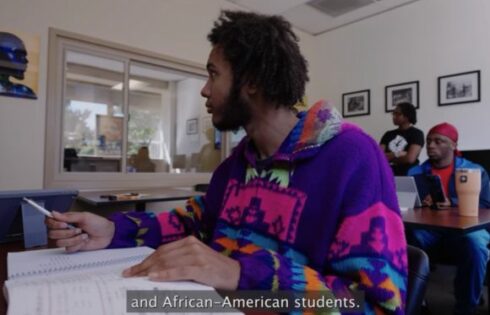
9 in 10 students oppose speech-permission requirement
The campus speech policies at Transylvania University are getting unwanted national attention at a time of transition for Kentucky’s oldest university.
The Foundation for Individual Rights in Education warned the administration earlier this month that its policies promote “viewpoint-based decision-making” and enact prior restraints on student speech, in violation of its other promises to students.
The private university has a single “free speech zone,” and students must fill out paperwork and get approval before using it.
The precipitating event for FIRE’s involvement was the administration’s shutdown of a Young Americans for Freedom free-speech tabling event, a day after it allowed the Young Democratic Socialists of America to table for their own causes.
Alex Drury, chairman of Transylvania’s YAF chapter, told The College Fix that theirs is the “only Conservative/Libertarian group on campus.”
It has tried to host “a number of engaging events, but most fall short due to the extreme bureaucracy in place at the university,” he said. Transylvania “has a number of anti-free speech policies which discourage the free speech of all students”:
The administration has to know literally every written word on [signs and literature on campus] and every message you are trying to spread so they can make sure that they know exactly what you’re doing and when.
The student body sides with YAF against the university’s restrictions on free speech, according to the results of a survey YAF distributed: Nearly 9 in 10 students hold negative sentiments toward the policies. (The survey response rate was just over 10 percent: 103 students out of the university’s 989 filled it out, according to Drury.)
“Free speech is an issue important to all students,” Drury said, “and the fact that this administration has so blatantly tried to restrict it that has really angered a lot of students, faculty, alumni, and donors.”
The administration refused to talk to The Fix before graduation on Saturday, even to answer questions about potential policy revisions, as opposed to the YAF incident itself.
Transylvania’s next president will have to deal with the fallout of the controversy.
Campus newspaper The Rambler reported May 13 that President Seamus Carey was stepping down, less than two weeks after the YAF incident. The reason for Carey’s resignation was revealed the next day: New York’s Iona College hired him as its next president effective July 1.
The next president may have a more pliant student media. Drury noted that the “firestorm” involving YAF came soon after the administration rescinded stipends for Rambler staff and fired the newspaper’s faculty advisor.
MORE: Kentucky law abolishing free speech zones doesn’t affect Transylvania
Veiled threat to make the approval process even more onerous?
The YAF chapter got the idea to table outside of Alumni Plaza, the designed free-speech zone, after seeing the YDSA chapter do it on May 1, Drury said.
Despite their tabling spot being outside the zone, the administration didn’t require YDSA to go through red tape to use it. The permission-free tabling was widely accepted: Drury gave The Fix a recording of YDSA telling YAF that staff, faculty and administration “had come on by” to “engage” with the socialist students.
Drury said President Carey himself passed the table and gestured toward the YDSA students, though he may not have known the activity was not permitted.
“We decided to table the next day in the exact same place at the exact same time with a petition for students to sign,” Drury said, that asks the administration to adopt the so-called Chicago Principles for freedom of expression, pioneered by the University of Chicago:
No less than 2 minutes after setting up, before we could even tape up our signs, we were approached by an administrator [Holly Sheilley, vice president for enrollment and student life] and told we had no right to be there as we were outside of the speech-restricted zone and had no prior approval to express our free speech. About 15 minutes later the Dean of Students [Michael Covert] approached us and said the same thing, even threatening to restrict speech rights further on campus.
In further audio recordings that Drury gave The Fix, he and YAF member Jacob Burnam tell Sheilley that YDSA experienced no trials or tribulations in order to table. The socialist group was told “you’re allowed to table wherever and whenever you want,” and the administration gave them options for where to obtain tables on campus.
The YAF students made clear to Sheilley that “a number of administrators walked by” the YDSA table.
Sheilley told them she was unaware of YDSA’s tabling because she “wasn’t there” that day, and that she had come across YAF’s table by chance. “I really need [you all] to pick up your things and go through the process” of reserving Alumni Plaza for their tabling. She told the club that Covert would be on his way.
In a third audio clip, Covert tells the two to pack it up and relocate to the “free speech zone.” Burnam asked him what would happen if they didn’t, and he responded: “I don’t know. Does [the process] become more restrictive? I don’t know…” and trails off.
Drury told The Fix that his club “sent a very friendly and cooperative letter” to Carey, Covert and Sheilley on May 7, asking “to work with us.” Though YAF physically delivered the letter, the group has yet to receive a reply.
MORE: Democratic lawmaker says free speech leads to dictatorship
Contractually bound to honor promises to students under state precedent
Three days after Carey’s resignation was announced, FIRE told the lame-duck president that the university should eradicate free speech zones from campus and set a higher standard for freedom of expression.
It demanded the administration treat political groups on each end of the political spectrum equally and fairly.
Will Creeley, senior vice president of legal and public advocacy, noted that the Student Handbook tells students they have the “right of freedom of expression” if they get prior permission to use Alumni Plaza:
Students wishing to stage a demonstration, display, rally, speaker, or engage in other forms of student activism will contact and arrange a meeting with the Dean of Students (or designee) to discuss the policy, demonstration-specific regulations, and safety issues.
He rattled off the requirements in the “space reservation system.” Thus, as Creeley wrote, “Transylvania students need a permission slip to speak their minds on campus. Obtaining that permission requires (1) meeting with an administrator and (2) filling out paperwork.”
This undermines other university policies as laid out in the Student Handbook, which states that “free speech is essential in a democratic society” and that “allowing students the opportunity to hear views opposed to their own is essential to the liberal arts mission of Transylvania.”
Creeley reminded Carey that the private university is contractually bound to honor its promises to students in the handbook and other policies, under the Kentucky Supreme Court’s precedent in Centre College v. Trzop.
“[R]equiring students to gain administrative approval before speaking out is exactly the kind of prior restraint on speech that the Supreme Court has roundly rejected,” Creeley wrote in a related blog post.
Even private universities must fulfill their promises to students “in a way that fulfills students’ reasonable expectations — and students are certainly going to expect that they won’t need to jump through bureaucratic hoops just to talk to one another,” he wrote.
MORE: Lawsuit targets one-hour lunch period for free speech at UMass
The “disparate treatment” of YAF and YDSA in their tabling activities “suggests that Transylvania administrators may react differently to speech based on the viewpoints expressed—an unacceptable result,” Creeley told Carey:
If Transylvania’s policy is only occasionally enforced, its continued maintenance creates an unacceptable risk of censorship of particular viewpoints through selective enforcement. Transylvania’s apparently uneven enforcement of its own approval requirements further demonstrates that its broadly restrictive policy is not only illiberal, but unnecessary. YDSA’s tabling did not disrupt campus operations; rather, it fostered the kind of student engagement and interaction that is a hallmark of a true liberal arts education. Likewise, no risk was presented by Drury and Burnam’s attempt to peacefully express themselves in conversation with their peers.
A spokesperson for the administration told Inside Higher Ed after the incident that the university’s policies on expression would be reviewed this summer. “We stand ready to help, because the current policy isn’t working,” Creeley wrote in the blog post.
When The Fix sought answers to how the policies might change, however, the administration refused to talk before hearing the questions.
In a phone call on May 21, a media representative interrupted The Fix to say that any and all questions “could not be answered until after graduation” on May 25.
On Friday, though, Vice President for Marketing and Communications Megan Moloney emailed The Fix without answering policy questions:
We have worked regularly with the Young Americans for Freedom student organization throughout the year to facilitate every event they have requested. Additionally, university administrators also met directly with YAF members several times this semester regarding their concerns. Our student life office, which oversees all student organizations, will be conducting a regular review of our current policies this summer.
Over the weekend, The Fix replied with follow-up questions for Moloney, but she has yet to respond as of Monday.
MORE: LA community colleges ditch speech zones to settle lawsuit
IMAGE: Minerva Studio/Shutterstock
Like The College Fix on Facebook / Follow us on Twitter





Please join the conversation about our stories on Facebook, Twitter, Instagram, Reddit, MeWe, Rumble, Gab, Minds and Gettr.